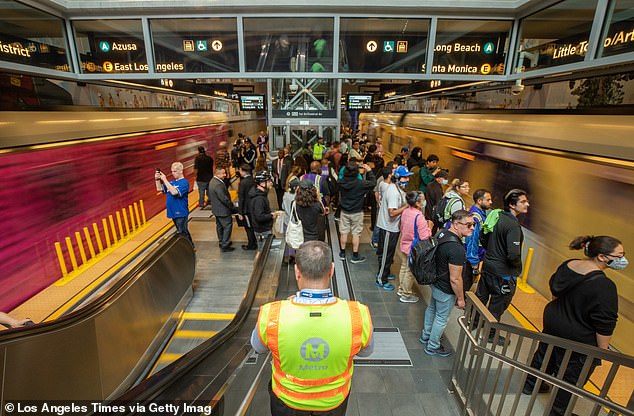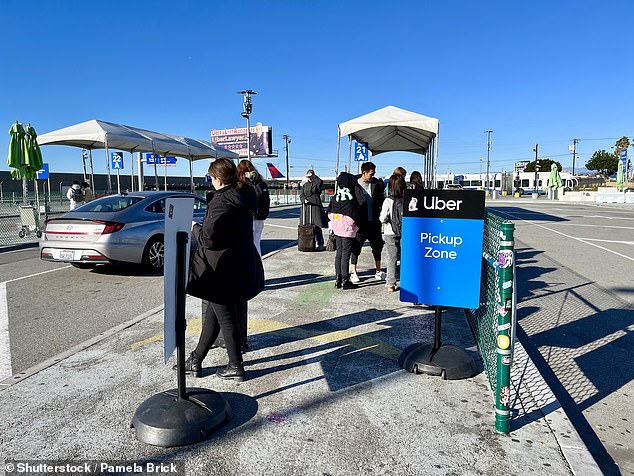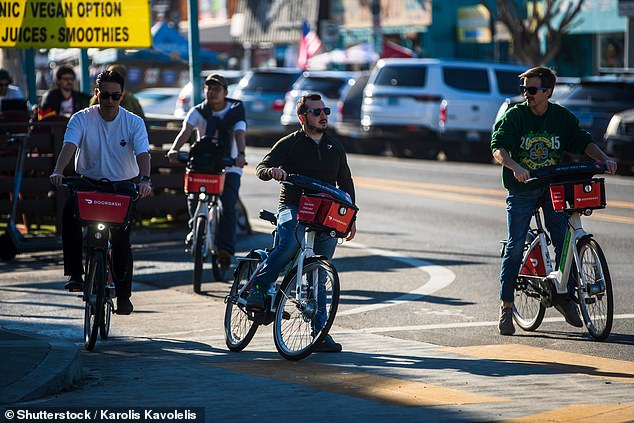Magic City Offers Low-Income Residents $150 Monthly for Dream Trips to Disneyland
Low-income residents in Los Angeles were awarded a $150 monthly travel stipend to spend on trips, including going to Disneyland.
The first phase of the Democrat city's Mobility Wallet Pilot Program commenced officially in May 2023 and wrapped up in April 2024 - providing 1,000 eligible individuals with a prepaid debit card to cover various expenses. transportation services.
The funds were permitted for use in public transport such as metro rail systems and buses, along with services provided by Amtrak and Greyhound. Uber and Lyft rides, along with scooter rental apps and bicycle shops.
The initiative, being the biggest one of its type within the nation, was introduced as a means to assist low-income people gain access to more secure and enhanced mobility options aimed at improving their quality of life.
However, with the completion of the initial phase of the project, UCLA researchers discovered that financial strain has once more become a heavy load for the community.
'The financial burden of transportation [is] a challenging one to cut out of my budget. I can try to reduce it as much as possible, but reducing cost means I have to pay in my time. I think the financial support is probably what I miss the most,' one participant of the study said.
At the same time, someone else remembered the happiness they experienced when they were able to go to happiest place on earth for the first time using his travel allowance.
He told researchers his childhood dream finally came true, 'creating a life-long memory at a place that would have taken too long to reach using only the bus and train.'


A fellow participant mentioned that they managed to attend their sibling's birthday celebration and had the chance to include their mom and dad as well.
They observed that under different circumstances, their parents wouldn’t have participated in the event due to concerns about transportation to and from the location.
The study revealed that female participants experienced a greater sense of ease taking part in the project, since they depended more on rideshare services rather than depending on public transport during late-night hours.
Recently, women using public transport in Los Angeles have felt apprehensive about traveling late at night and during weekends because of concerns over criminal activities, substance abuse, and unsanitary conditions, as reported. KTLA5.
In addition to having more engagement within their community, the people interviewed mentioned that the program provided them with a feeling of autonomy they hadn’t experienced before.
Rather than depending on friends or family members to possibly transport them to their required destinations, participants were able to make their own choices and embark on their journey solo.
Some individuals chose to transfer their stipends to their beloved family members by topping up their MetroTap cards, enabling them to travel more easily as well.
'I knew [my brother] was struggling because he had recently moved out from living with us and he was struggling, so I told him, "You know what? Look, they’re giving me this much. I’ll give you half of it, and now you don’t have to worry about … your bus fares for the month, or buying a bus pass",' someone revealed to the researchers.

They also found themselves getting important tasks done at a faster pace, including going to the doctor.
'Having access to ride-hail services, for example, gave participants another commuting option, especially when transit would not get them to work on time, or way to get to medical and other time-sensitive appointments,' researchers concluded.
Because of the pilot program, those involved experienced reduced stress, a better sense of community, more independence and an increased quality of life, the study found.
One participant even admitted they felt 'down' before embarking on the project.
'I feel coming into this, I was very, I don’t want to say depressed, but I was definitely down. I wouldn’t really go out,' they said. '
'I would remain at home all day simply because I didn’t wish to burden my family with transportation issues or worry about sorting things out myself. Staying home became more common for me. It certainly assisted me in lifting my spirits.'

Even though participants had access to numerous transportation choices and reported feeling more positive throughout their journey, researchers discovered that the 'transitory aspect' of the initiative restricted its lasting effects.
With phase one now concluded, the subsequent phase will commence shortly, permitting 2,000 individuals throughout Los Angeles County to obtain as much as $1,800 annually "for use on an array of shared transportation services," states the official site.
Although the participants felt satisfied with the outcome of the experiment, numerous internet users were furious upon discovering what had transpired over the course of a year.
'Distributing funds from taxes they lack and making citizens bear the interest—how revolting, this amounts to robbery,' one commented.
'Oh my gosh, are we really third world or what?' asked another person.
Another commenter stated: "This isn't free cash. It's our diligently acquired funds being distributed as we continue to face increased taxation, enabling them to keep giving away."
Read more
Post a Comment for "Magic City Offers Low-Income Residents $150 Monthly for Dream Trips to Disneyland"